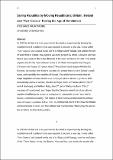Files in this item
Saving republics by moving republicans : Britain, Ireland and ‘New Geneva’ during the Age of Revolutions
Item metadata
| dc.contributor.author | Whatmore, Richard | |
| dc.date.accessioned | 2019-06-28T23:40:51Z | |
| dc.date.available | 2019-06-28T23:40:51Z | |
| dc.date.issued | 2017-07 | |
| dc.identifier | 250428644 | |
| dc.identifier | b97619cf-2948-4653-ad8b-93e726c1d655 | |
| dc.identifier | 85021731988 | |
| dc.identifier | 000417420000002 | |
| dc.identifier.citation | Whatmore , R 2017 , ' Saving republics by moving republicans : Britain, Ireland and ‘New Geneva’ during the Age of Revolutions ' , History , vol. 102 , no. 351 , pp. 386-413 . https://doi.org/10.1111/1468-229X.12418 | en |
| dc.identifier.issn | 0018-2648 | |
| dc.identifier.other | Bibtex: urn:e30e00bd67b563920ac8660b7e461bf5 | |
| dc.identifier.other | ORCID: /0000-0003-1295-7558/work/81797734 | |
| dc.identifier.uri | https://hdl.handle.net/10023/18002 | |
| dc.description.abstract | In 1783 the British and Irish governments launched an experiment by funding the establishment of a settlement that was expected to become a new city. It was called ‘New Geneva’ and was situated on the site of a village called Passage, just outside the port of Waterford in Ireland. New Geneva was to be peopled by rebels, Genevans who had fled or were ready to flee in the aftermath of the failed revolution of 1782. This article explains that for the main Genevan actors in the Waterford experiment, François d'Ivernois (Sir Francis d'Ivernois from 1796) and his friend Jacques-Antoine Du Roveray, the exodus from Geneva was part of a greater battle to save Europe's small states, and especially the republics of Europe. The article further reveals that the major supporters of New Geneva were seeking to address Britain's problems both domestically and as an empire. Charles Stanhope, then Lord Mahon (from 1786 3rd earl of Stanhope), and William Petty, then 2nd earl of Shelburne (from 1784 1st marquess of Lansdowne), each hoped that the Genevans would introduce cultures capable of palliating the excessive corruption or ‘mercantile system’ they saw in Britain's commercial society. The history of New Geneva underscored the perilous state of Europe's republics before 1789, the widespread extent of the view that Britain and Ireland were in crisis, and the fact that extreme and cosmopolitan reform projects were in the air before the French Revolution. | |
| dc.format.extent | 28 | |
| dc.format.extent | 484905 | |
| dc.language.iso | eng | |
| dc.relation.ispartof | History | en |
| dc.subject | DA Great Britain | en |
| dc.subject | T-NDAS | en |
| dc.subject | BDC | en |
| dc.subject.lcc | DA | en |
| dc.title | Saving republics by moving republicans : Britain, Ireland and ‘New Geneva’ during the Age of Revolutions | en |
| dc.type | Journal article | en |
| dc.contributor.institution | University of St Andrews. School of History | en |
| dc.identifier.doi | 10.1111/1468-229X.12418 | |
| dc.description.status | Peer reviewed | en |
| dc.date.embargoedUntil | 2019-06-29 |
This item appears in the following Collection(s)
Items in the St Andrews Research Repository are protected by copyright, with all rights reserved, unless otherwise indicated.

